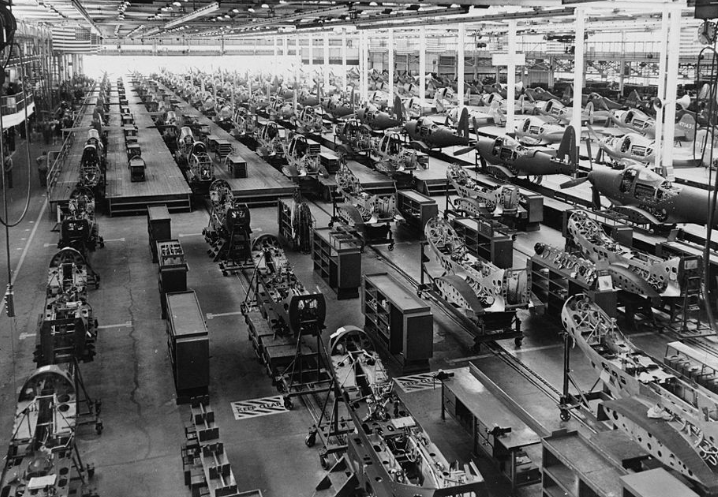The Hidden History of Prosperity

... One vivid, positive experience in our collective memory suggests how the economy could be drastically different. World War II, even more than the New Deal, profoundly altered the economy in ways that generated a more equal society, with more opportunity and security, than the one we have today. These structural changes reinforced one another and affirmed government as friend of the common person.
The war was, first, a massive macroeconomic stimulus. Unemployment was still more than 14 percent in 1940. Thanks to more than $100 billion of war-production orders in the first six months of 1942—more than the entire gross domestic product of 1939—joblessness vanished. The war also recapitalized industry that had languished during the Great Depression, and it gave government a central place in developing science and technology. The war was not just a huge jobs program but an unprecedented job-training program. President Franklin Roosevelt also chose to use war production to increase the power of unions as full social partners. A company that wanted defense contracts had to recognize its unions. So the war transformed labor markets.
Second, the war altered incomes. Steeply progressive income taxes with marginal rates as high as 94 percent, limits on executive compensation, and strict controls on the bond market led to a compression of the income distribution that lasted more than a quarter-century. The need to finance the war led to emergency measures pegging the rate on government bonds at a maximum of 2.5 percent. The Federal Reserve simply bought whatever quantity of bonds the war effort required. This meant that a major category of financial industry profit—buying, selling, and speculating in Treasury bonds—was eliminated, at the expense of the rentier class. Economists even have a name for this process: repression of finance. We could use some of that today.
A side effect of the Good War was enhanced social solidarity, which in turn reinforced political support for egalitarian policies. On the home front, people from diverse walks of life joined in scrap drives, served together as civil defense wardens, and waited in line together for ration coupons. A famous survey showed that white soldiers who served together in units with blacks came out less prejudiced than ones who had not. Much of the enhanced propensity for civic action that social scientists such as Robert Putnam and Theda Skocpol have found in the generation born in the 1920s and 1930s was the result of their wartime experience.
All of these structural and attitudinal shifts did not abruptly end in 1945 with V-E and V-J day. They had a long half-life and continued to contour the American economy for at least another generation. To a far greater degree than is understood, the broadly shared prosperity of the postwar boom was a child of the war. It’s also important to appreciate that many of these shifts reflected not fortuitous side effects but deliberate political choices. Franklin Roosevelt could have made war-production planning mainly a business responsibility as Woodrow Wilson had in World War I, but he chose to make it a substantially public affair. He did not have to use defense contracting to strengthen the labor movement, but he chose to. Wilson, in World War I, did nothing to help organized labor.
Thanks for the history lesson, you might say, but what does all this have to do with the present-day economy? Thomas Piketty, in one of the year’s most celebrated economics books, Capital in the Twenty-First Century, demonstrates that the tendency of wealth to concentrate is an inherent characteristic of a capitalist economy. But, Piketty adds in passing, the exception is national emergencies such as wars.
A program of public investment aimed at resilience as well as a green transition could produce many of the same distributive benefits as the Good War. It could restore a sense of our common fate as Americans and reclaim faith in democratic government....